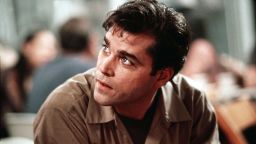Editor’s Note: Gene Seymour is a critic who has written about music, movies and culture for The New York Times, Newsday, Entertainment Weekly and The Washington Post. Follow him on Twitter @GeneSeymour. The opinions expressed in this commentary are solely those of the author. View more opinion on CNN.
The unexpected death of Ray Liotta, at 67, while filming in the Dominican Republic set off more than the customary shockwaves over social media. People spoke of Liotta as though they lost somebody they knew intimately from their old neighborhoods or school days.

He was, in other words, someone you may not have always kept close tabs on but were always glad to see – and counted on seeing again, however unexpectedly, and always coming through for you.
Liotta established a kind of familiarity with his audiences that seemed unusual for a movie star. But then, Liotta wasn’t, technically, a movie star in the same manner as a Tom Cruise or Paul Newman. You could say he was closer to being an archetypical character actor. But character actors generally aren’t known for making audiences a little wary, even vigilant, towards the kind of unexpected jolts and tonal shifts you get in a hard-rock guitar solo.
From the start, Liotta made you wonder what you were getting. Four years before he won global audiences’ affection as Henry Hill, the ingratiating, upwardly mobile mobster in 1990’s “Goodfellas,” Liotta made one of the most stunning big-screen breakthroughs ever as Ray Sinclair, the volatile, homicidally jealous ex-convict in the 1986 screwball comedy “Something Wild.” His intense, blue-eyed stare conveyed both malice and merriment; he made you believe the worst was not only possible, but inevitable from his character. And yet Liotta also made you see the thin layer of vulnerability deep beneath the hair-trigger temper as well as a bluff jocularity that made his intended victims believe that, just maybe, they could talk him out of dealing out the pain.
And there was that laugh. Whatever the role, whatever the context, Liotta somehow managed to let loose an explosive barrage of toothy giggling that, over time, became as much a personal signature as that thousand-mile stare. You heard that laugh from Ray Sinclair, but also from the ghost of Shoeless Joe Jackson emerging from an Iowa cornfield in 1989’s “Field of Dreams.” Baseball purists knowing that the real Jackson hailed from the Deep South may have frowned at first hearing Liotta’s New Jersey accent in the role. But he won them over, too.
He was always able to return to the dark side, as in his role as a psychopathic cop in 1992’s “Unlawful Entry” and also starred as a grieving medical examiner seeking the cause of his wife’s death in the 1996 science-fiction thriller “Unforgettable.” Over the years, he would solidify his reputation for stealing scenes as in “Hannibal,” the 2001 sequel to “Silence of the Lambs,” where he played an overbearing Justice Department administrator who gets his – um – just desserts from Anthony Hopkins’ Hannibal Lecter. He also made a surprising, but wickedly effective turn in 2019’s “Marriage Story” as a bombastic, high-profile divorce lawyer named Jay Marotta – who very nearly stole the movie out from under its stars Adam Driver, Scarlett Johansson and Laura Dern.
In whatever medium, movies or TV, and in whatever role, whether it was leading man, supporting role or even voicing an animated character (as in a 2008 episode of “SpongeBob SquarePants” where he was leader of the “Bubble Poppin’ Boys”), Liotta got noticed – and always appreciated. He won an Emmy for guest-starring in a 2004 episode of “ER” and was nominated for a Screen Actors Guild award for playing Frank Sinatra in the HBO movie, “The Rat Pack.”
That was the thing with Liotta: whether bad apple, good fella, two-faced schmo or conscience-stricken family man, he enveloped you with the sense of the hard, honest work he was putting out in front of you while making sure you never noticed him acting. Call it professionalism at its steadiest and most consummate.
But something more than professionalism had to account for Liotta being able to more than hold his own in “Goodfellas” with Oscar-winning powerhouses like Robert De Niro and Joe Pesci.
Get our free weekly newsletter
Liotta could even fascinate when he was playing straight-down-the-middle roles in movies like the relatively-forgotten 2005 crime urban thriller, “Slow Burn,” where he was a crusading district attorney with (of course) Higher Aspirations. When those plans crash and burn, his character is resigned to selling real estate from then on. “I wouldn’t vote for me either,” he says ruefully.
For the record, I would have. Come to think of it, I’d even watch a movie where a Ray Liotta did nothing but sell real estate. What are the odds that would’ve gotten interesting fast? Especially when something or somebody made him laugh.






